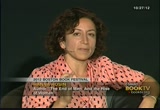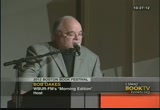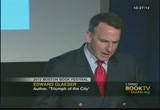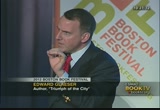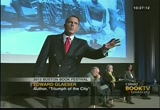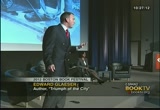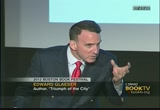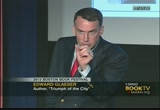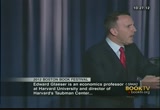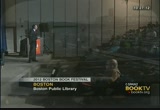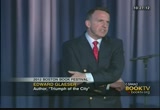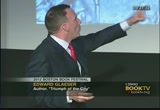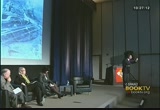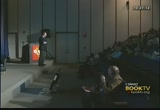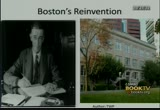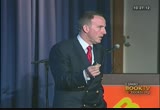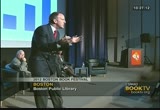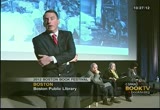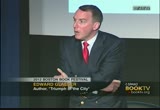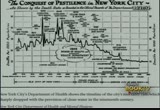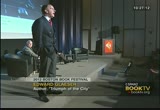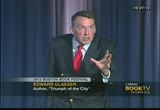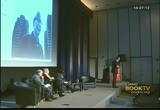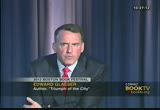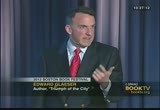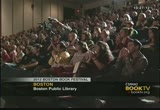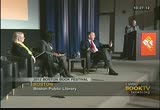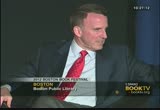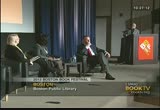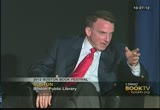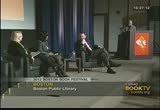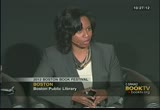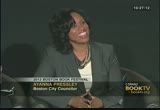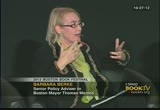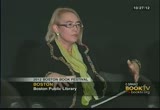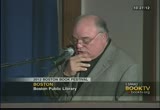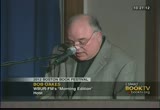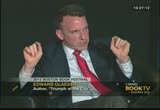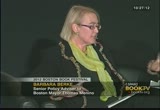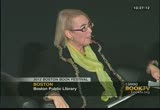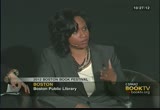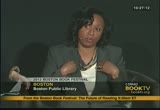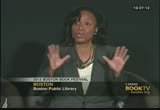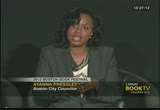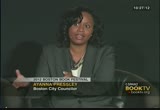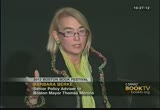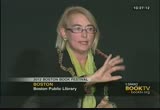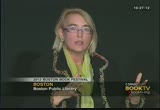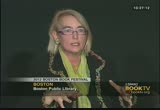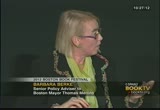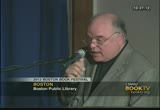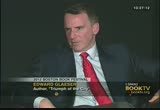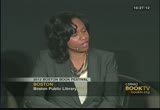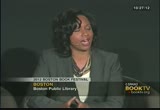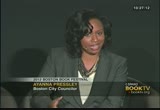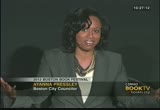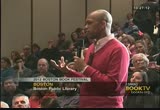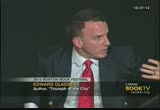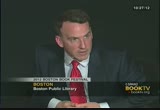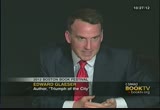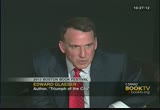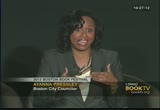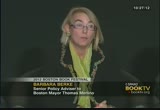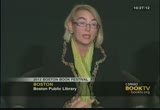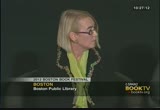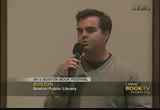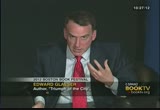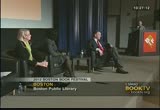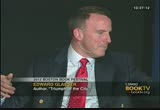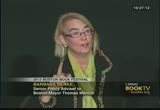tv Book TV CSPAN November 25, 2012 8:15am-9:30am EST
8:15 am
woman in so many different ways kind of culturally in terms of workplace opportunities, in terms of self-conception and identity has been just really radically transformed almost more than any other phase of our life in the last 30 years. so -- >> well, on that note even though we've only begun the conversation today, i'd like to thank hanna rosin, anita hill and mad din kunin so much for joining us. thank you so much. [applause] >> from the fourth annual boston book festival, a panel entitled the triumph of the city, featuring edward glaeser. it's about an hour, 15. >> good afternoon and thank you very much for coming to this auditorium today. let me introduce myself, i'm bob oakes from morning edition on
8:16 am
wb, ur, boston's npr news station. [applause] thank you. thank you. i'm sure some of you are saying, wow, that's bob oakes? this. [laughter] i thought he was taller, i thought he was thinner, i thought he had more hair, and, you know, the funny thing is that all those things were true last week. [laughter] let me thank all of you for coming here this afternoon and thank the boston book festival for having us. don't they do a nice job? isn't this a atlantic event? -- a terrific event? [applause] let's also thank the plymouth rock foundation for sponsoring this particular session and say that without their generosity, it would be hard to put on events like this that add to the cultural life that we all enjoy in this great city, so thanks to them. [applause]
8:17 am
and in a way that's what we're here to talk about this afternoon, the triumph of this city and all the cities, the triumph of the city, that's the title of harvard economics professor ed glaeser's book, it's about what's made cities around the world great, about the challenges that they've had to overcome and still face. we're going to talk about in a few minutes in the special context of this city with our panel, and we'll take questions from you as well later, but first, to launch us off with a presentation, here's the author, professor ed glaeser. [applause] >> thank you, bob. and thank you all so much for being here. i'm so enormously flattered that you decided to take time out of your saturday afternoon to come and talk about cities. i'm also particularly grateful to the boston book festival for including this book. i mean, i, like i think every single one of you, love books, and i'm just thrilled to be part of this amazing thing that goes on here.
8:18 am
well, let me start, let me start with a portrait of america, and i call it a portrait to make it really clear from the very start that i have absolutely no aesthetic sense whatsoever. [laughter] but this is a sort of a portrait. i've taken the 3,000 odd counties in this country, and i've split them into ten. each dot represents roughly 300 counties on the basis of their density levels. because at their heart cities are the absence of physical space between people. cities are proximity, density, closeness. the bottom line shows the relationship between density and income. as you can see, there's a steadily increasing relationship there where the densest tenth of america's counties earn on average on a per capita basis 50% more than the people living in the least dense half of america's counties. this is a common phenomenon in the united states and throughout the world. the three largest metropolitan areas in this country produce 18% of our nation's gdp, almost
8:19 am
a fifth, while including only 13 percent of america's population. the top line shows something that may be something more surprising. it's the relationship between population growth between the years 2000 and 2010, and initial population density. as you can see, until you get to the very top tenth, population growth goes up steadily with density. at the start of the 19th century, we were leaving our enclaves on the eastern seaboard to spread out and take advantage of the american wealth. at the start of the 21st century we're clustering in, we're clamoring to be close to one another. now, we see in boston the resurgence of a great city. we see in new york, in san francisco, in seattle, in chicago, all of these places, and london and paris, we see the triumph of the developed world cities. but the success of the city in the developed world is nothing relative to what's happening in the developing world. we've recently reached that halfway point where more than
8:20 am
half of humanity now lives in urbanized areas, and it's hard not to think on net that's a good thing. because when you compare those countries that are more than 50% to those less than 50% urbanized, the countries on average have income levels that are five times higher. gandhi famously said the growth of a nation depends not on its cities, but on its villages. with all due respect to the great man, on this one he was completely and utterly wrong. because, in fact, the future of india is not made in villages which too often remain mired in the poverty that has plagued most of humanity throughout almost all of its existence. it is the cities, it is bangalore, mumbai, it is delhi that are the places that are the pathways out of poverty into prosperity. they are the places that are the conduits, the channels across civilizations and continents and the place where india's transforming itself from a place
8:21 am
that was practically a synonym for poverty and deprivation to a place that is bubbling with opportunity. now, in some success -- in some sense, it's something of a paradox. distance is dead, every single one of us could just telecommute in to whatever, you know, whatever business employs us. occupying in whatever spot appeals to our biofill ya, and yet in so many cases we choose urban life. we choose the inconveniences, the high cost of living in urban areas despite the fact that all this new technology would make cities obsolete, it was predicted, and yet bag google wt do they do? they build the google plex so that their workers can be right next to one another. silicon valley, right? practically the most famous geographic cluster in the world, it's also the industry that is
8:22 am
the most technologically savvy. why is it that all this new technology seems to be hypercharging our cities? now, this relatively rosy view of cities is very unlike the new york of my youth. these -- i was born in manhattan in the 1967. i say that warily in the boston public library. [laughter] but i was. and these are two iconic images from my youth. we could have similar images of new york -- of boston in the 970s as well. the bottom image is of gerald ford denying new york's request for a fiscal bailout. ford didn't literally tell new york to drop dead, but lots of people think he meant it and, indeed, it looked as if new york was very much headed for the trash heap of history. the city had been hemorrhaging manufacturing jobs by the hundreds of house in the 1960s and early '70s, the largest industrial cluster in the u.s. in the 1950s was not automobile production in detroit, it was garment production in new york city, and
8:23 am
that sector was decimated by globalization and new technologies. the city had been caught in a spiral of disorder, rising crime rates, racial conflict just like here in boston, and the fiscal situation had gotten out of control with budgets that were far too high for the city to afford. it looks as if new york was going to go back to the weeds. this is an image of jimmy carter wandering through the wasteland the south bronx had become, and it really seemed as if planet of the apes image was plausible. that, in fact, these cities were things whose time had come and gone, in part the future of the city seemed so dim because their original reason for being had largely disappeared. if you think about every one of america's older, colder cities, they were all part of solving a transportation problem. they were all nodes on a transportation network. if you go back to 1816, we as americans sat on the edge of an
8:24 am
enormously wealthy continue innocent that was virtually inaccessible. in is 1816d -- in 1816 it cost as much to ship goods across land as across the entire atlantic ocean. over the course of the 19th century, we built an amazing network. we built canals, we built railroads that supplemented the canals, and cities grew up at buffalo, the western terminus of the erie canal. the oldest cities were typically where the river meets the sea like boston and new york, but every one of america's 20 largest cities in 1900 buzz on a may -- was on a major waterway. chicago made it the linchpin of a watery arc that went all the way from new york to new orleans, and industries grew up around these transportation hubs. chicago's most famous industry is, of course, its stockyards, and that's what you're looking at right now, right?
8:25 am
those stockyards were part of the problem of getting the corn that america grows so well then and now, and it would even without utterly beknighted agricultural policies followed by the federal government with subsidizing corn, that was a completely unnecessary aside, i apologize for that. [laughter] but we would be very good at growing corn with or without those subsidies. the problem was getting it to market. that very portable, highly durable and quite tasty form of whiskey. we then moved to pigs which are, of course, corn with feet. [laughter] salted pork to salted beef, and then once this character, armor, figures out about refrigerated rail cars, you put the blocks of ice on top rather than below o so that cold water drips down, you're able to have a single great stockyard in chicago which is moving that, those corn-fed beef in a cost efficient manner east. now, even though cities form for
8:26 am
utterly prosaic reasons, miracles happen when smart people come to being round each other, when today innovate near one another, when they learn from one another. think about athens 2500 years ago or florence 600 years ago where a city built on wool and banking, but a city that connected brilliant people who learned from one another and created a chain of collaborative genius, figures that the basic mathematics of -- he passes it on to his friend, don tell la who passed it on, who puts it in a painting in the chapel, that beautiful image of st. peter finding a silver coin in the belly of a fish. who passes it to along to pot chelly -- bot chelly, each person borrowing from one other. and so it was in detroit when they collaboratively invented a mass-produced car. it's not just about this character, ford, who came to
8:27 am
detroit -- a classic -- working at detroit dry dock, that providerred him with the skills he needed to become an innovator. cities, as now, are forgers of capital. it was about the dodge brothers, fisher brothers, billy durant, charles kirby. collectively they managed to mass produce automobiles. in the short run, this was a great thing, right? but in the long run it was a disaster. successful cities at the dawn of the 23st century look -- 21st century are mocked by having small firms, smart people and connections to the outside world. how far away from this is the rouge for its great factory? walled off from the outside world, employing tens off thousands of less employed workers. they never could have experienced et anywhere else. it was factuallies -- factories that made detroit quite possibly
8:28 am
the most productive place in the 9 50s, but these were not a recipe for success because they don't need the city, they don't give to the city. they're a world unto themselves. they follow their own very strong internal calculus of cost minimization, and when conditions change -- and they always change -- you just move the factories to places where it's cheaper. you have nothing left. and so as transportation costs declined, we moved these factories to lower cost locales, we moved them to the suburbs, we moved them to the right to work states, and we moved them across the country. now, detroit still has not recovered from deindustrialization. in part, detroit has really the worst of all possible worlds. it had a single large industry, a few dominant firms. those crowded out all local entrepreneurship. they have 25% -- they lost 25% of their population between 2000 and 2010. luckily, not all cities followed this path. we all know, many of us know the
8:29 am
story of boston's regeneration, transformation from an old industrial textile town to a capital of the information age, but it's easy to forget that seattle, 40 years ago to reality jokers asked the last person to leave the city to, please, turn out the lights. because seattle's future seemed so dim, because boeing was cutting back on its jobs. no one could imagine a seattle without boeing just like no one could imagine a detroit without general motors. this was before amazon, before costco, before microsoft and starbucks. seattle came back. it came back because of skills and entrepreneurship just like boston. these are two of the people who played an outsized role in boston's rebirth as a capital of ideas. that's bush, mit scientist, adviser to presidents, a man who very much was a statesman who moved the academy into the world
8:30 am
of commerce. he was, indeed, the mentor of fred terman who ld go on to be the father of silicon valley on the other side of the country. .. there's a whopping difference in terms of population growth over the last 10 years. if you want understand why seattle and detroit look different, utility to look much further than 12% of detroit's
8:31 am
adults have degrees. spent with a college degree up by 10%. your wages go up on average by 8% over your own years of schooling cost. it's that valuable to be a round skilled people. the role of skill and explain why cities comeback helps us make sense of the paradox with which i began this talk. the connection for skills and city growth reflect the fact is to facilitate the flow of knowledge. but what globalization and new technologies that is the increase the returns to be smart. to increase returns innovation. because you can sell it on the other side of the planet. you can buy on the other side of the planet. you're competing in a global marketplace. to increase the complexity of the world. the more complicated the idea is the more likely it is to be lost in translation. anyone who was ever taught knows the hard thing about teaching is not knowing your script.
8:32 am
it's knowing whether anything you are saying is getting through. whether or not, when you're in the same room you can dig advantage of those wonderful cues we have evolved over millions of years for communicating comprehension or confusion. in some sense cities are so valuable because they take offense of humanity's greatest asset which is our ability which we have when we come out of the womb to soak up information from our parents, peers, siblings and even from teachers. cvs make that happen. they enable us to be smart, to become smart by being around other smart people. that's why google builds the google plan. that's why silicon valley exist and that's why boston has come back. this is a city where we can come and be smart by learning from mistakes and successes of people around us. the most important skills that happens in cities, the most important ideas are not, in fact, the skills that are taught in colleges although those are
8:33 am
clearly helpful. the skills learned afterwards on a city street. there's no skill or talent more crucial for success than entrepreneurship. inclination, the ability and measure like bishop employment of starters or the average established in size. our very good predictors in small establishments and more growth, success. eight years for the economist and their neocon pittsburgh notice nude was more resilient even then. he argued this was result of a historic concentration of the private sector which was the mother of entrepreneurship because of so easy for anybody with a good idea to get started on and was a couple of sewing machines. i contrast, pittsburgh had used to. like general motors a fantastically sufficient company in the short run but not a place to train entrepreneurs. the middle managers in u.s. steel like a middle managers in u.s. news would not know how to start an electronic greeting card company.
8:34 am
those garment guys would. their whole lives bending -- more skyscrapers any other new york in the 19 choice but to get started in the garment district he declared he was certain 1930 would be the greatest of all building years. he died for. [laughter] now, of course, not everything about cities is rosie. particularly won joon lee the u.s. -- when you leave the u.s. spent over the course of history, cities have been battling with the demons of density, crime, disease, congestion. this is a map of death rates in new york for 1800 today. a boy born in newark city
8:35 am
could've expected to live seven years less. we don't understand fully why cities like boston and new york are healthier than lower density areas. among older people to death rates are low. some people credit walking. some people credit more social connection. today causes of death for the young, motor vehicle accidents is a. it's a lot safer to get on the key after a few drinks then is to get behind the wheel of a car. not that i'm recommending anything. suicide is more of a puzzle. where suicide rates -- maybe it reflects social connection. maybe the gun culture. is a strong correlation between hunting licenses per capita and teen suicide rates across counties in the united states. this didn't happen by accident. america's cities and towns only became safe through massive expenditures on waterworks. america's cities and has to spend as much on water at the
8:36 am
start of 20th century as the federal government would spend everything except for the post office and the army. there some urban problems like congestion that require more than merely an engineering solution. the problem with building more roads is a just cause people to drive more. something called fundamental of traffic congestion that establishes that vehicle miles traveled increased roughly one-to-one with highway miles built. if you build it, they will drive. the only way to make sure city streets are you sufficiently is to charge people for it. you what singapore does, second density country and work and yet you can drive around effortlessly during prime hours because they have the electronic road pricing thing that charges you for using street. america -- america's cities are running a soviet style urban transit policy. by this i mean that in the old soviet union the use of grocery stores that would give away eggs and butter are below market
8:37 am
price. the result was aligns. you couldn't get the goods. that's what we do with her city street. we give access away for free. there's the urban equivalent to long lines which are not traffic jams. streets they cannot be traveled. there's no path and other making people pay for the cost of their actions. we pay plenty to one of these challenges is how to make them affordable. i know of no way to solve this other than building them other than providing more supply. is now repeating the laws of supply and demand. this is where jane jacobs got it wrong for she looked at old buildings and new buildings and noted that old buildings were cheap while new buildings were expensive. which led her to conclude the right way to observe affordable and was make sure no one got any new buildings on top of old buildings. that is now supply and demand works. you don't need to look any further their own historic preservation district of greenwich village which you worked so hard to create.
8:38 am
her home district which was affordable when she and her husband lived there in the 1950s has turned into a place where town has to start $5 million only hedge fund managers need apply. that's what happens when you turn off the chain of building new housing. one of the reasons why so important to nurture our cities is one way to enable our cities to grow, is the environment. i'm going to end by telling a story of a young harvard college graduate is beautiful spring day in 1884 with for a walk and he did a little fishing. fishing was good. there hadn't been much related to any came to put the fish in chowder. it is boston after. the wind came and flicked the plane he was using and the fire started and spread. and it spread, and eventually turned into a raging inferno which burned and more than 300 acres of prime would lend. in his own day this young man was cast it as an inning of
8:39 am
environment. he was called -- i think was pretty bad for 1844. indeed, it's hard not to see that they were right because i can't get any young man living in boston or cambridge who get as much damage to confinement as this young man did. of course he is henry david thoreau, no so good as a environmentalism whose buchwald and seems to preach a gospel of what a wonderful thing it is to live surrounded by nature. his own life tells a very different story. and so my preach is the moral that we are a destructive species and if you love nature, stay away from it, as indeed he would have been nature a wonderful degree of good if it stayed home instead of lighting fires and the middle of the woods outside of concord. there is a modern equivalent to this, which is that when people, and i need to make it clear, i know about this. when i started acquiring small children about seven years ago. on the economist talk about acquiring small children. i, too, moved to an area not far away from where he lived in us
8:40 am
are doing almost as much damage to garment as i wrote it. the reason why people in suburbs tend to be significant more incremental damage is much longer cartwright. much larger housing it. one-way ticket about this is that the great growing economy in china per capita carbon emissions levels go up about 100% if they stop at the level of wealthy but hybrid -- out by less than 30%. that's a huge difference. whether or not you live in global warming are worried about the price of gas at the pump, we have a lot to gain by china in the building of rather than a. i think the most important thing for america to do in order to encourage a to have it is to get it some urban policies interpret that means stopping our cities as if they are the ugly stepchildren of america and recognize them for the economic heart line, apart a chance -- the heartland for this country. the american dream can only mean
8:41 am
a homeowner in the suburb every means rethinking policies that pay for highways with general tax revenues, driving people to drive longer distances, above all honor city schools which are such critical ingredient for urban success in such a critical problem which despite enormous hard work by people language, mayor menino, like the city council, are so far from what they should be. and, of course, finally allowing in of buildings so that every young couple that wants to live in the city can actually afford it. i don't want it into something fully. i think the baseline despite the challenges, the track record when work together, we were from one another, it's just tremendous. i had every piece of optimistic belief that cities will continue to power to manage its future and create marvelous things for centuries and now mulling yet to come. thank you. [applause]
8:42 am
>> ladies and gentlemen, i think what we just learned in the last few minutes in addition to learning a lot more about how our cities developed is that no one sleeps in his classes at harvard. [laughter] >> and by the way, he will be signing books in the lobby of the auditorium up about once we're done. let me introduce our panel. in addition to edit, ayanna, good afternoon spent hi, everyone. >> good to see. >> and senior advisor to mayor menino, barbara burke. barbara, good afternoon. [applause] >> and i want you to take us, let me start this with the i want you to take as little further back, because in the book you say that boston's rebirth has as much to do with the recent politics as what happened in the 1630s. explain. >> if we think about where
8:43 am
boston, how boston came back, it's hard not to place an outsized role for the education that the city has always invested in. and, indeed, we have examples of vannevar bush, and he's an example of when the people are brought the cabin into entrepreneurship. now boston's education didn't start with mit. although mit is an example of the land grant colleges that have a remarkable correlation according to some. mits our land grant college. if you think about boston's turn towards education, it didn't happen in the 19th century. it didn't happen in 18th century it happened when the first bostonians almost 400 years ago community cited to great the boston school and then use state funding to create harvard. these were investments that they've set the course for years afterwards. i often think of it that you would need to just have vastly
8:44 am
high degree of education. possibly believe that crossing the atlantic to be able to be with people who think that -- that you really need to be highly educated to think that that is what the. if you think back, the roots of our educational investment are not always will attract but it's nice to think we thought that harvard was a great institution but we were very worried about the jesuits leading the king of the antichrist i think was a word that is often used to describe if there's a jesuit education in the new world. so we were a part of this deeply, deeply religious fractious world. at our university under schools succeeded. it worked out for the best of course but its roots go back to the religious fractures of the early 17th century. >> so if the boston as a center
8:45 am
of higher education continues to bear fruit for us, continues to report us, does the mere presence, let me ask you this question, does the mere presence of harvard or eastern tough. >> bbc you on all the rest guarantee, do you think that we say that weight in the future? >> there's certainly never any guarantee. i always believed that the best economic develop a strategy is to attract and train smart people in a more let's get out of the way. so that's basically suppressing we can do is still no guarantee, but we face significant challenges which is there's an incredible river of doubt that runs through our schools but it's hard convincing him to stay in boston. a couple of years ago ayanna's colleague and i shared this committee for future boston and i spent a lot of time having conversation with twentysomethings about whether that was troubling about boston and why they wanted to leave. a lot of them a check at high prices and said look, if i'm going to pay this much for an
8:46 am
apartment i can go to newark and have a better night life. i was not aware it to stop. and part of it of course is just how open the city is to entrepreneurship, the new start. that's something the mayor with the innovation district has been very focused on trying to make boston be more startup friendly. but i mention are you have lot of little establishments, an indicator of both entrepreneurship, suffolk counties table. is not just an issue of the few industries like health care. this is not a county that tradition has a lot of small startups but it's been dominated by large-scale older employers. this is something is a big chunk of the thrilled and there is a country o on the with dementia e river of doubt stage and is free and empowered to make radical changes. >> ayanna wants to weigh in. >> yes. so, we simply go to the
8:47 am
democratic national convention in jane clarke reminded there with all the talk about the economy that we don't live in economy, we live in a society. and i care deeply about the kind of society that we are creating. and i use the word creating one purpose. today, community does not happen organically. we have to be very intentional and deliver about that. and while the city council's current in the midst of it we assign a process, i've learned that quality is subjective, the definition of that. while the city council is in the midst of the redistricting process i've learned that community is subjective, and how neighborhood is defined. so i do believe in investing in infrastructure and all those things that would eradicate or medicaid a brain drain your but ultimately i believe that it doesn't matter if we have more
8:48 am
for affordable housing or better jobs or better schools. if people don't want to live here. that has everything to do with community, and the soul of a city. people want to be a part of a city that is diverse and inclusive and welcoming. neighborhood is about social interaction, and naturally how we build community in a city like boston as 20 distinct neighborhoods, which i'm very proud to represent them as one of four at-large boston city counselors, we have to be very intentional about how we foster the social interactions. and i think that we'll be giving short shrift to these larger sort of macro issues if we didn't speak about what's really out the heart of it. and if you want people to want to be a part of a community. and the last thing i would say,
8:49 am
at least for now, is that i studied latin when i was in school, and i was really think spending time with a linguist who was remarking that both young people and adults are often referring to where they reside as their hood, that we have all but taken out of the word neighbor. and how critical it is that we start to put that back in in our language and what impact that might have. >> barbara burke speak well, i was going to build on that point, what neighbors do for the hood, because community has changed a lot to get used to be when people came to a committee can even when immigrants came to the community they came to a tight, small community. they were faith-based communities. there were schools were everyone in the school was integrated around surfing the child, the parent and finding clothing and services, everybody in the
8:50 am
temerity was lifting everyone else up. and we went through a period of evolution, a lot of our cities, where they became very fragmented. because of some of the burdens ed describes in his book. we had a slight of the people who created those structures that listed people. but the message in his book is that cities still do that, but we need to be more conscious of how we do that, how we rebuild that lifting in infrastructure. and when you attract young people and people with the dreams, when you attract immigrants, as you pointed out, when you attract entrepreneurs as we're trying to do with the innovation district and all the other ways we attract entrepreneurs, even the way we try and a track out empty nesters, people who come back with their work and a time and the encore careers and the volunteer time. all of these people's dreams are interesting and better features
8:51 am
create lift and that creates momentum and that brings people in to the system. but what actually -- your book at one of the saddest sentence i've read in a book in a long time. i grew up in cleveland. i realized i was pretty old when you said you were born in 67. did you say this because yeah, 67. [laughter] >> in 1967 i was 12. and my dad used to give me two boxes and to go to downtown cleveland, the cost of quarter to take the train downtown, get lunch. i feel really old. but he was a photojournalistic he said that ncsd. see the infrastructure of the city i grew up in a city that was dying, where jobs had left from infrastructure had left. community had left. but look at what's going -- people were leaving the cities in the midwest. and where are they going? all these young people, this is
8:52 am
an amazing thing. he does real research. i do predominate research. in my pajamas last night, looking up the ipad about urban studies. so 1991 we had 30 urban studies programs, graduate urban studies programs in the country. now there's 120. young people are not only flocking to cities, they are flocking to the study of city. and that's going to give us something very interesting. these are the urban mechanics to our understanding the mechanisms that cdc's to lift people -- that cdc's used to lift people. >> let me stop you and talk about how we keep -- there's an awful lot of people in this audience and so glad you here this afternoon. public policy makers have been talking a lot in boston in just the last few years about the cost of living here. talk about how the cost of housing drives people out.
8:53 am
you know, that might be true for young and mobile professionals, but it's not what most people talk about. not, most young people talk about. easy read blogs, blogs written by young people about why they have decided to leave boston after spending therefore plus years here, here's what they say. i've read a lot of these blogs in the last two years and they just almost anywhere, the last few days, and they just kind of stunned me. to small towns, not cosmopolitan, extremely clicky and provincial. but this is community is too insular and to close knit, not enough for entertainment and ed, not only does the key close early, but the bars close at 2 a.m. >> i remember that. in my '20s. 20 years ago. spent first when i read this, i kind of chuckled a little bit, but when i saw these comments repeated by the hundreds and hundreds and hundreds, i realize
8:54 am
it's not a meeting. we have a cultural problem here in boston. but a majority of these young people said was, for years plus a couple more and i'm out of here. not one of them, not one of the comments that i read mentioned the cost of housing except to say you can get a better apartment in boston for 2000 bucks a month and you came in new york. if the young and the innovative at the future lifeblood, the present lifeblood and the future, than how to address address this huge cultural and lifestyle, which is not being addressed in the city right now? >> you know, these are such a great set of comments but i think they make one critical central point which is real cities, the real heart of the city, the essence of the city is not the structures and infrastructure that you see around us so on pictures of posters. it's always the people. it's always about humanity. no investment in infrastructure makes sense unless it ties to the real needs of people are
8:55 am
living in the cities. the second one and i think is critical in this is the backdrop to the decline of all these older industrial cities was the transportation cost be collected there was no longer so valuable to be near the great lakes or the coal mines and so forth. what this meant was instead of having cities that were tied down by production advantages, like the old general motors factory, cities could go to a consumer cities, places where people want to live. that's one way of understanding why they're so very bold during the 20 century that january temperature, above all, americans went to places that have warmer and warmer january. now, that is both a challenge and an opportunity. because, in fact, would only survive by attracting and retaining talent. that's not easy. part of it involves getting the basis of city government right. part of it does involve affordable housing, short commutes, low crime rates, livable neighborhoods. but a lot of it is also about
8:56 am
crime. it is to be near other twentysomethings to take advantage of fixed cost things like the boston public library that was fantastic urban assets. now, i'm not printing in particular comments about our culture here in boston but it is true that if the are regulations that make it difficult to innovate, it is true if there are berries erected by groups to make it difficult for smart people to come up with new ideas, that means cities lose their edge but it loses the fact that urban entrepreneurship is just as good at making restaurants and clubs and bars and everything else. half of it is about attracting talented half of it is about setting the degree but i will do one example from this, that is, i'm so glad the mayor has joined the truck by because it's one of my favorites. i indeed am passionate about free the food truck. because the food truck bed in one of the young hungry professor outside of my office building to but i was on a call
8:57 am
about 18 months ago with a woman who wanted to open her food truck in detroit and she had been on a one year regulatory battle to get her food truck. the idea that detroit would say no to any transfer you want to come to detroit, it's just not understand you need some help direct but basically it's not. the wonderful thing is the on button in detroit on the call, on the public radio call in and he said well, listen lady, we will never catch you. [laughter] >> i have a daughter who just graduate from college. wanted to live in a city. i've been hearing train stop early, cabinet too expensive, the bars close early or if i did at my kitchen table. xmi mobilephone.
8:58 am
that you have to explain something. boston has the highest proportion among the nation's biggest cities. 35% of the people who live in our city are 20-34 years old. i mean, that's the facts. so we may have a very vocal population who are used to texting each other about how the city could be better. but not as many of them are going and reading as you might think, and many more of them, imagine what a night that we are with all of the schools. i think one of the biggest questions is we could be much better city for longer nightlife and later hours and mixing people in a social environment in different places. but would also be a lot better at introducing all the cities who flock our downtown and universities to our neighborhoods. which are really phenomenal and rich and have lots going on. and you know, so we are being successful. we could be a lot better.
8:59 am
>> well, i think i can speak to this personally. i originally hail from chicago, illinois. i'm sure that will come as no surprise to people here, because i'm onto and with all the other black progressive paul's. [laughter] who run for office and make history. [applause] >> so i came here to attend boston university and made a commitment to not only contribute to my campus community but to connect to the larger city. in fact, that was why i had, i would ask him it was a financial package, too. harvard rejected me. and believe me, every time i lectured her i remind them, and i say and this a full circle moment? [laughter] i don't say anything. anyway, that was for aspects. but the point is, averaging help from chicago, illinois. eichinger to attend boston
9:00 am
university. i was a student leader and very active in my campus community. made a commitment to invest in the city as well which was really the turning point in my life. said in a completely different trajectory but i was president of my student body. eyed intern for condit and joseph p. kennedy who has since retired. .. >> i appreciate the applause, and it has nothing to do with a
9:01 am
personal achievement. i think really it's a collective and shared victory for all of us. it means that the solutions that we're developing in government are more comprehensive and more fully informed because of that different perspective. so i thought a great deal about this issue, of retraction and retention. more than that, how do we keep native bostonians? because we were losing younger people who had been, who were raised here who were going someplace else. they do come back, though, i have to say that. they sort of go on this pilgrimage to see what else is out there, i but they do come back. and so to the point around social issues, this is an issue that i'm working on. again, we have 22 distinctive neighborhoods, and it's very easy for us to be very siloed. i think what young professionals are looking for and what i was looking for and found when i went outside my campus community is community is human connection. and i think, um, restaurants are revolutionary in this way.
9:02 am
in my home neighborhood of door chester, i have seen a restaurant like ashmont grill transform a blighted corner and, in turn, an entire neighborhood and incentivize other businesses. so restaurants are not only incredible economic anchors because they hire locally, but i think they foster community. ashmont grill, if you walk in there, it's one of the most diverse venues you could patronize in the city. people are looking for community. on the development side, i'm a big believer in smart growth development. i don't own a car, so i want development that is -- [applause] you're applauding. my knees in these stilettos, i don't like that. [laughter] i love the boston brick. [laughter] but, you know, i do take the t to work every morning. i'm in a smart growth development developed by trinity financial, riding the at that time measurings -- st. marks
9:03 am
area of dorchester. and we have an incredible community there. but back to to the issue of restaurants before it turn it over to the next question, i'm working on the issue of liquor licenses. and i have to say one of the reasons why our student population and our residents are in conflict is because the second someone starts talking about greater he's access to -- greater access to liquor licenses, people think you want to convert main street into new orleans bourbon street. i want more social venues and an equity in that opportunity, someplace that people can go and raise a glass and celebrate a christening or a graduation. and the reality is right now we're seeing an inequity in an access to those opportunities. so a neighborhood like north end has a density of, like, 91 liquor lines, and a depressed neighborhood or neighborhood that could be even more more successful like a hyde park is
9:04 am
having difficulty procuring those licenses. and restaurants make about 70% of their revenue on their bar. so i think restaurants can play a revolutionary role in building community and in building culture and keeping young professionals here. >> let's stay on real estate development, if we can, but let's go bigger, bigger than bricks and mortar, let's talk about steel girders and glass. here's the premise ed raises in the book, shiny new real estate, meaning big, new development, may dress up a city, but it doesn't solve its underlying problems. too many officials think they can bring cities back with some sort of massive reconstruction project. let's stay with our city officials, agree or disagree with that? >> well, let me -- if i can speak for a little bit. >> yes, please. >> i agree with what he's saying. you cannot build your way out of a problem with a lack of competitiveness. but one of the things that i did when i was working with the state, i was part of the romney
9:05 am
administration, secretary of economic development, was understand that boston is doing tremendously well economically, but if we wanted to turn around, um, the pioneer valley or southeastern massachusetts, we had to turn around the fates of springfield and fall river and lowell and lawrence. and in order to do that, it wasn't plopping down a single courthouse. >> that's right. >> that wasn't going to fix it. it wasn't going to be building a new walled convention center that had its back to the city. the only way you can transform a city is with a strategy that builds on the city's assets, that tightly weaves people together around our educational assets, our human assets, our community-based organizations, our old industrial assets and some of the new skills that are spinning off of them. and until you knit those pieces together and can find the new
9:06 am
narrative lines that come out of that, you know, that the old, you know, this is a providence and fall river example, the old jewelry business, those little, fine skills of making costume jewelry are phenomenal skills for medical devices. same little set of talents and molding and work. there are all sorts of talents hidden that we can build on. when you invest in those, you can grow a city. i always used to say, i mean, a lot of people like to think of economic development as attracting businesses with deals. my view is it's come for money, go for money. they never attach, they never stay. we've seen many bad investments. but when you line up a new job producer with a community college and a research investment in the local university and you begin to find the scholarships and the cop ops and the -- co-ops and the whole ladder that lists that sector of the economy -- that lifts that
9:07 am
sector of the economy, that's the way you move from one place to another. and, i mean, i'm really proud about what this state is doing. we have lots of people figuring out how to do this. mass inc. has just launched the gateway cities work, we have all the work at northeastern on the rebirth of older industrial cities, we have this terrific book that ed has written that is beginning to show us the ladders. he's doing something else really interesting, we have the rappaport scholars. we are in all of our universities in boston and in massachusetts are tilting towards our cities. our lending, their research, their insight, their vision, their bright young people towards with engaging at the front line and lifting the city. and so we here, i think, are in a particularly interesting place. and especially when we have a mayor in front of us who's been, you know, he was faulted for being an urban mechanic constantly, constantly working on the basics that he services,
9:08 am
but people forget that it was always about people and that these structures he's building are these ladders of human development. the acceleration agenda, the boston public schools has built attaching the low end with the new thriving five early childhood strategy and the success boston strategy, and wrapping the out-of-school time strategy around this acceleration agenda. our friend paul grogan who's not here is wrapping with all the work he did to help organize the opportunity agenda to wrap our city's biggest funders around or those pipelines. and then that urban mechanics whether you're building that pipeline for a new bostonian -- and, you know who was the first mayor to build a new bostonian whole service sector, whether you're building an innovation district or lining up your ladder, and who remembers the
9:09 am
mayor's don't borrow trouble campaign? we escaped a huge amount of foreclosure because we built the home ownership ladders, you know? we are doing it here. and young, talented students, you're sending us more of them, are the new urban mechanics. some of you may be in the audience today, but that energy, that tall element, that -- talent, that brains around energizing and engineering a community's capability to lift people. that's what we've got going on in this city. that's why this room is full. >> absolutely. >> i ask the development question because i feel compelled to ask a news-oriented question, i don't know why. [laughter] >> bob, can i say one thing? >> i'll get you weighing in in a second. the biggest development on the horizon for boston is the possibility of a billion dollar casino complex being built in east boston at the suffolk downs
9:10 am
race track if the developers, when the eastern massachusetts casino license -- one of the three up for grabs from east to west in the state -- the new state gaming commission, of course, has to go through its process, but most insiders you talk to think that the east boston plan has the best chance of any to go all the way. and i'm wondering, and, ed, let me start with you here, and then i want to go to ayanna. i'm wondering if this panel thinks if that project, if built, will prove to be a triumph of the city? >> i, i'm relative agnostic on casinos. i'm enough of a libertarian not to think that gambling is a great sin, and i think it's not a terrible thing. on the other hand, it's unlikely to be any sort of a wellspring of further innovation or entrepreneurship that's going to come out of the area. i think the critical issue is whether or not it's going to, you know, make sure it covers any cost to the public sector of
9:11 am
maintaining it. but i see it as being neither a game changer, nor a great evil, although -- so i just, i just don't, i just don't have a strong view on it one way or the other. >> i'd like to say something different. the greatest infrastructure project we have in our city right now is the work being done to restructure the school assignment plan. that is not physical infrastructure, it is human infrastructure, and it is really big. time is now in this city for people to get by. >> well, i wrote my last column on it. i'm happy -- i've got much stronger views on that than i do on the casinos. [laughter] >> yeah. however we solve it, being able to create a stronger education system that serves people -- >> let me ask ayanna about the casino. [laughter] >> you should answer the infrastructure question though. [laughter] >> yeah. are you giving that to me because you felt i was just clamoring to comment? [laughter] well, it's no secret i'm not a big fan of casinos.
9:12 am
but they are coming, and, you know, the lens with which i look at these issues is in making sure there's going to be an opportunity for everyone, that the entire city is benefiting not only in the revenue that stands to be generated, but in the jobs to build the site, in the hotels and the restaurants and the retail. i will share with you, again, not to vilify or demonize any one industry, my own personal experiences being raised by a single parent with a father who struggled with drug addiction and was in and out of jail in my life and supporting that addiction, i just personally am very conflicted about things that i see as contributing to the social ills that i work to combat every day like human trafficking, like drug abuse, like alcohol abuse. speaking about -- >> domestic violence. >> domestic violence. again, i don't want to, you know, demonize or vilify any one
9:13 am
industry, but the data does show that there are a confluence of things that contribute to these social ills. so that's what i would say about casinos. two quick points, your point about the schools which ties into the question i wanted to speak to earlier, we talk about a commitment to -- and i know the mayor shares this as does our superintendent -- to teach the whole child. but we are not being, we're being disingenuous if we don't acknowledge that most children are not entering that school whole. they are broken. and we have to have a commitment to their social-emotional wellness, and that's not just a moral issue, there's such a thing at social-emotional intelligence as well. and one's ability to, um, learn executive function and to ultimately be more competitive and better prepared for the work force. there's such an emphasis on
9:14 am
science, technology, engineering and math, i would never give short shrift to that, but i would be remiss at the boston book festival if i did not say that we need an a in that. [applause] because without art there won't be any innovation. [applause] there won't be any innovation. so what we need is theme. and when it comes to our economy as well, i'm a very aggressive advocate and a believer in the creative economy. and i know our mayor shares a commitment to that in everything from public art to arts education to arts in education. you know, when i travel, people do talk about that school across the river, harvard, but the next school they'll ask me about is berkeley. you know, we boast so many incredible institutions related to the creative economy, and so i can't be here amongst the tribe and not talk about the humanities and arts.
9:15 am
>> i'm looking at the clock, and i see that we're actually only about 10 or 15 minutes from the end of the program, and i want to make sure that if you folks have questions you want to ask of our panel, that you get some of those questions in. does anyone have a question that they'd like to open up with? right, right there, in the middle is the first person i saw, and i think that there's a microphone for you coming down the aisle. all the way down front. all the way down front, sir. the man in the red right in the middle. >> hi, my name is sam, and i work with citi here in boston. >> oh, yeah. [applause] >> so i'm glad that you touched on education. obviously, the headquarters are here in boston, but they're also in 22 other cities in america, two others overseas, and my question is are urban schools
9:16 am
destined for failure, and what do you believe is the role of the community, of the city, of the federal government and so on? because it seems that, you know, this thing of urban schools struggling, it's not just a boston thing. we're in 22 other cities, chicago, l.a., atlanta and so on. >> of course it's not a boston thing. overall, the boston schools are doing quite well compared to their urban counterparts, although that is a statement that's laced with more of a sense of tragedy than triumph. it is -- i can't possibly think that the failure of urban public schools is permanent. i can't wake up that way. i can't imagine that that is what we are going to doom our city children to forever. i believe that we are making improvements and, indeed, the test score data does show that, and we will continue to make improvements. part of the challenge that we start with is that cities have an abundance of people with less
9:17 am
means. not because cities make people poor, but because cities attract the poor. they attract the poor with the promise of economic opportunity, with better social services w the ability to get around without buying a car for every adult. some of my work looks at what happens to poverty rates near a subway stop. poverty rates go up nearby. that doesn't mean they're hurting them, it means they're doing exactly what you'd hope they're doing, providing a means for people with less means to actually get around. but if cities are going to attract people with less means, it's going to make it more difficult to provide good urban education because parents with assets, parents with an abundance of human capital can provide things for kids to supplement what goes on in this a school. this makes this an enormous challenge. now, there are many different strategies, many being tried at different ways. unquestionably, i think the federal government has a role in this. it has a role because education is the best means we know of of fighting inequality, of creating
9:18 am
a juster world. there's no consensus for large scale redistribution among adults, but i believe this country is not so far gone that we cannot get a national consensus beyond the need that every american should have the opportunity at a decent education, that a decent education affords. and you need the federal government involved because when you try to do anything involving giving particularly to poor people, it doesn't work. we've tried this in the '50s, '60s and '70s. the companies just leaf if you try -- leave if you try to run a welfare state. often pushing against, one of the advantages of race to the top was it pushed up the charter school limit within this community. i think in terms of actual strategies, i certainly agree with ayanna on the arts, i certainly believe in the ability of art to enrich and empower all of our lives. but there's a lot to be said for math, right? the work of josh goodman shows
9:19 am
each extra year of math education upping the minimum years increased adult earnings by 8%, okay in big payoff to actually having quantitative skills. the other thing we know that has had effect, many charter schools have been quite successful. we have lottery results in boston that have shown this. i'm enough of an economist to believe in competition and innovation in the that is chartr schools and make that happen. that being said, right, we cannot forget on the public system as a whole, the most critical ingredient we know in schools is teachers. it's all about the human capital. it's at the teacher level. to me, public school teachers are heroes. the people that go in every day and fight in very difficult conditions to make lives were br for people who are starting with less. the work of my colleagues looks at the impact of teachers on test scores and compares it with the impact of those same teachers on earnings as adults. and even though the impact of teachers on test scores peters
9:20 am
out over years, the impact of teachers on earnings does not. and we all have experienced this in our life. some teacher early in our life who changed us, who opened our eyes to something, who moved us along the way. it's exactly about this process of learning from people who are close to you. and so there's nothing that's more critical in terms of rebuilding, enriching our urban school systems. they have, a, plenty of support from the federal government in terms of resources, b, the right incentives and the freedom to get the best possible teachers they can have and the ability to pay them well and, c, i'm enough of a believer that they could face competition from charter schools as long as those charter schools are properly regulated. >> i agree with all of that. i would just also add it really is the symbiotic partnership of many things, the confluence of things. i think parental engagement is incredibly important as well. and so, ultimately, if we're not working on those social determinants and those
9:21 am
nonacademic barriers that complicate and put in conflict that child's ability to succeed scholastically and also in life, um, then this is all for naught. so i do believe all of the issues we've been discussing here are critical components of that, because you can have a good school, but if there is a depressed community around it and families that are destabilized because they are working two jobs or they don't have access to adult basic education, how can they advocate for their child? and navigate a school system for them? so it has to be a holistic response. >> i just want to build and make one additional point that i think is an interesting one. a lot of people say because we have so many immigrants and non-english speakers that is making it harder for our schools to teach and our schools to teach and succeed. you may know that about 45% of boston public schools' children do not speak english at home. but what you might not know is
9:22 am
some of the terrific research that's been done about how english-language learner children are doing in boston. and when you disaggregate them by the ones who have almost no english, they are not doing so well. when you see, though, the children that have gone through the system and have a little bit of language, they are doing equally well. when you look at the kids who have been through the system and who are former english-language learners, they are outperforming the native-born children in boston public schools. and you need to look at our valedictorians. we are graduating phenomenal kids who are dual and multilingual, and we need the opportunity structures that lift these kids up. and i think the reason that they're surpassing native-born children if you think very carefully, these native-born children, their parents were failed by school. and in some cases their
9:23 am
grandparents were failed by the failure of urban public schools. and these parents do not believe in their personal experience that schools deliver opportunity. and so until we can reach back to serve the whole family -- not just the whole child -- >> that's right. >> until we can reach back into early childhood, can we reach back to support parenting like we are with thrive and five, until we can reach back with parent university and the huge investments we're making in the city, until we reach back with adult education, when we reach back, we're going the move forward when we get multiple generations at once. and that is what this city is doing now. because we are performing, but we have a huge way to go. >> all right. we're just about out of time. just one more question. panelists, all the way here on your left. go ahead, sir. >> paul duffy, mother from --
9:24 am
[inaudible] father from hyde park, lived in -- [inaudible] [applause] beacon hill and now south side. i find that in addition to its size which is very manageable, one of the real keys to success of boston is the high regard that the city's government has for government. and in an era when civic engagement in government at all levels is held in low esteem, erroneously in my view, boston stands apart and is quite successful because of that intimate involvement. no one's been to a christening in the boston in the last ten years that the mayor hasn't been to. [laughter] same with, you know, counselor connolly, counselor pressley, counselor ross, etc. so those of you from outside of the city, government officials or city officials from other cities, do you share that view?
9:25 am
>> well, absolutely i share that view. i mean, i have enormous respect for both the city council and for the administration, and i think you're absolutely right that cities need governments that respect government. one way to think about this is an abundance of land hides many sins. but when people are crowded together, they need management. they need management to deal with congestion and contagious disease and urban schools and all of the issues that we are facing. those problems don't get solved by the private sector. they need a functioning government. and so it's always been. it's why a hundred years ago we had city governments long before we had a large, active national government because it was so critical that we actually deal with the problems that boston has as a natural result of its density. they need it more. and that's central and is not going away, and i think we are absolutely blessed in this regard. we continue to have problems like the school systems that continue to need more work, but
9:26 am
we get nowhere by vilifying government as a whole. and, indeed, we should cherish our local leaders as well as occasionally goading them to do better on things. that's part of the democratic process. but we should fundamentally be grateful for the sacrifices they make. let's save our vilification for those people who serve at the national level. [laughter] [applause] >> and along those lines, let me ask one last question. we are 15 days away as of today from what has been widely called the most presidential election of our lifetimes given that the choice between the two men running for office is very, very different. as we're in the final days, let me ask you this last question. do you see greater challenges facing cities, boston in the particular, under a mitt romney presidency as opposed to a continued barack obama presidency, and, ed, i'm going to start with you. >> i think the track record of
9:27 am
the national government with cities is very, very weak, and i think that that's true under both parties. occasionally, very well meaning but weak, and occasionally not so well meaning but weak. and i think that's the larger challenge, how to create an urban agenda that actually makes sense. one that doesn't and, again, you know, this means pushing back on policies that mean massive spending on highways with general tax revenues. i mean, president obama's the most urban president we've had since ted key roosevelt in many -- teddy roosevelt in many ways. the latest highway bill, we had a mass infusion of general revenues instead of gas taxes to pay for drivers. i have no idea why we are bribing people to drive long distances. i believe that people should be free to drive if they pay for the social costs of their actions. but we shouldn't be bribing them to do this. we shouldn't be engaging in social engineering that uses federal tax policy to massively
9:28 am
subsidize people to move out of urban apartments to buy someone urban homes which leverages them to the hilt which also bribes them to build larger homes. i'm a homeowner myself, but i think having the current home mortgage interest deduction and the other things like fannie and freddie that subsidize that is crazy. we should slowly ratchet back that by $100,000 a year, and most of all, we should have even more commitment to urban schools. i would like a world in which the feds have less engagement in cities overall and leave cities which are perfectly capable if they are empowered, if they have the resources to solve their own problems. i'd much rather have that happen. >> barbara, and then ayanna gets the last word. >> well, i think the interesting thing to remember race to the top started with bush, it's been advanced deeply by obama. we are doing things at the national level to reduce the education disparities. obamacare started with romney,
9:29 am
it was romneycare before, and that giving everyone access to health insurance is, again, one of the most important things we can do in this nation to level the disparities in health and the disparities created by lack of access to health insurance. so we have bipartisan support for two of the most important things that are going to level us. i think the thicks that we -- the things that we don't do is think about where do we help the most people the fastest, thinking about per capita returns on investment. and i think our biggest weakness as a nation is community colleges, is the skill gaps that we have left open, left wide open between the industries that we're holding on to as we compete globally and how well we've done educating the people to take their place in the economy. and i would hope that whatever agenda comes forward we have
115 Views
IN COLLECTIONS
CSPAN2 Television Archive
Television Archive  Television Archive News Search Service
Television Archive News Search Service 
Uploaded by TV Archive on

 Live Music Archive
Live Music Archive Librivox Free Audio
Librivox Free Audio Metropolitan Museum
Metropolitan Museum Cleveland Museum of Art
Cleveland Museum of Art Internet Arcade
Internet Arcade Console Living Room
Console Living Room Books to Borrow
Books to Borrow Open Library
Open Library TV News
TV News Understanding 9/11
Understanding 9/11